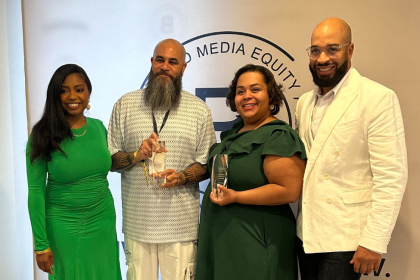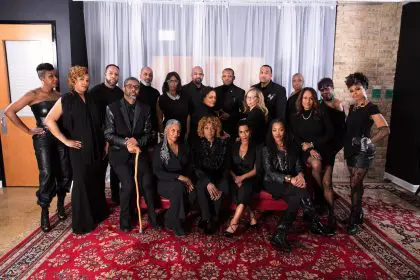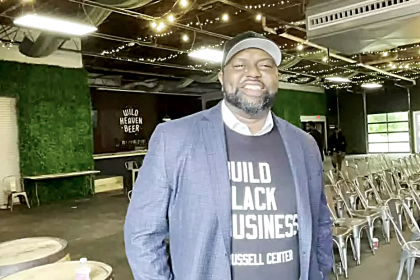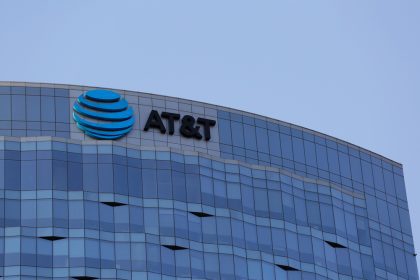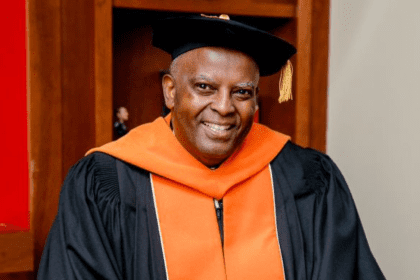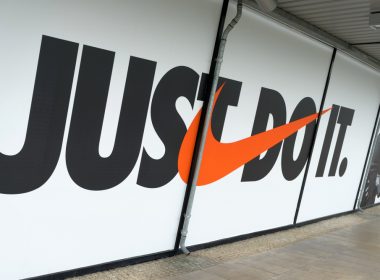Krista Bourne is a history maker and is the first Black Chief Operating Officer (COO) for Verizon Consumer Group. Having starting her career as a mailroom assistant, she has continued to work her way up through the ranks, serving in roles of increasing responsibility, including director roles in customer service and retail sales, regional president for Houston Gulf Coast and Carolina/Tennessee regions, market president of the 12-state South Central market and as SVP and president of sales and operations for the Verizon Consumer Group.
In her current role as COO, she is responsible for the deployment of a fully-integrated omni channel experience, propelled by a keen focus on operational excellence. She leads a distributed team of passionate employees who serve more than 100 million customers and deliver more than $88 billion in annual revenue. During her 20-plus year tenure with Verizon, she has focused on providing extraordinary customer experiences across several parts of the business.
Rolling out recently spoke with the Rochester, New York native during Women’s History Month to find out more about her history-making journey.
How important is it for you to acquire skill sets as you move up in the corporate world?
It’s a game-changer. I think the mistake I see people make is they chase a title. A title is just that. It should define a scope of responsibility. To be very deliberate about the time you spend in your career, you should get very focused on skills and capabilities. Why are you in that job? Why is that title important?
I personally look at every job as an assignment. There is something in it for me to get and something in it for me to give. The other thing I would offer people is, it’s not enough to ask, “what do you look for in talent?” You’ve got to get very clear on “do they see that in you”. That is where you can be very crystal clear on where you need to go work.
If they’re looking for data literacy, if they’re looking for a level of expertise or certification that you might not have, you need to hear that so that you can go get it. That is your job all the time. Your number one job is to navigate the world of skills and capabilities because they evolve. When you hear people talk about rescaling the workforce, that’s just another way to say ongoing learning and development. It doesn’t end and it shouldn’t stop. The question is will you be proactive in going to get those things for yourself? I think it’s a game-changer, and I think it’s very important.
How should a young man or woman set goals?
You have to think about the level of impact you want to have. If you go back to my philosophy that every job is an assignment, there’s something for you to gain and something for you to give. That’s a matter of impact. If you know your legacy, you want it to be one where you have a large-scale impact on a large part of the organization. You’re going to need to build up to large team management, distributed team management, whatever those skill capabilities might be. You need to be thoughtful about every job you take, that you understand, and what impact it will have. Is it laddering up to the legacy I’m trying to build? For every hour you give is an hour you won’t get back. If you don’t turn that hour into something that delivers on your passion, to me, that’s a missed opportunity. I feel very, very clear about that in my career.
What would you say to individuals who are really trying to figure out how to get on a board?
Think about a board assignment just like you think about your employer. I tell people you can’t always choose your manager, but you might have had the chance to choose the company. That means do your research and go online. Companies need to express themselves outwardly, in my opinion. If diversity, inclusion, equity, sustainability, and being a good corporate citizen matter to you most, you can read about that on their website. I encourage you to do so. I happen to feel very proud that Verizon expresses very boldly our position, aspiration, and ambition around those societal issues that I care about. That makes it a good corporate fit for me, and you take the same approach with a board, but you should be selfish and should be selective. Once you associate your personal brand with a board or with a company, you’ll need to be accountable for that association along the way. Be thoughtful, and hold them to account for what they showed you or told you about their brand because they express it very clearly on their website.
Technology plays a role into the future. How should the Black community approach technology?
I think we need to understand that having a screen in front of us is no longer a source of just entertainment. It is a life tool and if you use it as such, it can unlock levels of information and access that can give you the advantage you need in real-time. It is a learning tool for students. We’ve got to work hard as a community to close the digital divide to make sure that all students and underrepresented communities have access to technology because it will give them access to a future that they will otherwise be challenged by if they’re not used to it or familiar with it. We’ve got to go one step beyond TikTok and understand the revenue that TikTok is generating. We’ve got to go one step beyond the YouTube video that’s entertaining us and understand the messages that it’s communicating to us. This is a life tool. It is not just a luxury and a point of entertainment. We as a community need to be very concerned and work really hard to make sure we are connected, and that we are not disconnected because we have other challenges in our community to deal with.
What are habits that you utilize in your daily routine to maintain success and sanity?
Number one, anyone that knows me will tell you I spend an incredible amount of time reflecting. I don’t think we spend enough time just thinking about everything that we just did. I do a lot in an hour, I do even more in a week. By the time I get to the end of the month, if I don’t make the time to reflect, I’m likely not going to take account of what I’ve done, or what I’ve gained from it and what that means to me. There’s confidence found in reflection and there are choices that you can make in reflection. So, reflection is important. I schedule it like anything else if that’s important to me.
The other thing is I don’t get lost or intimidated by what I don’t know. I am quick to do a Google search on anything you say. That’s okay by me, and I am going to go find out what I need to know about that word, that term, whatever it is that you just said. I am a student of my industry by choice. That means I am open to learning always. I read a lot. I look for case studies. I’m a big fan of Harvard Business Review. I think it’s a great resource. But I’m not afraid to go looking for what I don’t know.
Third, I am very vulnerable with people who I think have expertise. Whether that is our communications team that helps me organize my thoughts so that I show up the right way, or whether it’s my frontline partners that give me direct insight because they’re closest to the customer. They can help me stay grounded in reality, and I have no problem being vulnerable with the experts in front of me because that’s how I can get better. It’s real basic stuff like that, but I don’t think that we give enough time to just good old-fashioned conversation. I mean, what’s the point of networking if you don’t use the network?
How do you best create positive, productive, and profitable conversations with the individuals you speak to?
You return the favor. People give you what you give them. You have to be authentic and know that you will get what you give. One of the things that I try really hard to do is to be authentic. That means I use my own natural language, I don’t try to use words that I’m not familiar with. I can’t worry about impressing you at this moment. What I need to do is be purposeful for the intent. So, why are we here? What can I offer? What can you offer me, and then let’s get to it. I think you have to remember, you get what you get, I see that coming a mile away. And everybody else does, too.
As a culture, why should we as Black men and women make sure that our children have a love for learning and reading?
I think in books, in articles, in case files, there is perspective. Imagine sometimes you get asked the question, who would you have dinner with if you can have dinner with anybody? The beauty is you can have dinner with a number of authors that have taken the time to document the experience for you, document the perspective, have that moment, and reflect. There’s a private level of learning that is safe, and it is informative. It could be a perspective that you would never otherwise see or hear from anyone in your circle, and that means you now have something you can offer to that circle. You add value because you took the time to benefit from someone else’s perspective. I think it’s very important to read.
Why is it important for us all to learn different languages of culture?
Because it equals respect. I think how we communicate to one another, how we articulate our name, how we respond to words or descriptions, all of that equals respect in society. I think it’s easy to come across like you have a lack of respect or a lack of empathy if you don’t make room for the culture, and understand the differences that come from other individuals. I find that usually, the crossroad is in communication. It’s a mishap in what I said, how I said it, or what I meant for you to hear because somewhere in the dialogue, I’ve left you with a level of disrespect. It’s a matter of showing respect and empathy. I think it’s a human behavior that we need to keep practicing.
I also think kindness is something we need to practice. We have a campaign called a call for kindness that I started with our team here, because just the idea that we’re human beings on the other end, regardless of the service, you’re providing, the work you do, the education you have, it’s still a person. We’re at a time where people expect to be respected, and I think communication is a key aspect of it.
How do you network and demonstrate kindness so that other people think that’s part of the culture?
It is in our actions. It is kind of me to say good morning. It is kind for me to open the door, it is kind for me to say thank you, it is kind for me to give grace when there’s a mistake that is at play. You can demonstrate it through your actions. It is also kind to give feedback and honest feedback to help people get the development that they need. It’s kind to make time on your calendar for somebody so that they can have a safe mentoring conversation with somebody that might look like them. There are so many ways for you to demonstrate and express kindness, and it literally is the free thing that we can all do to make society better. And you’ll feel better at the end of the day.
How do you find mentors to challenge yourself to go to the next level?
It’s about being provocative. If you’re mentoring people, or you’re searching for a mentor, you’ve got to know what they want out of it. I mentor people all the time, but I’m mentoring because, not only do I want to give, but they have something to offer me. They have their own experience, their own perspective, their own outlook. It’s a great way for all of us to stay connected. When you’re developing mentors, or you are seeking out a mentor, understand what the mentor needs to get out of that relationship, because it’ll tell you everything about how much they’re going to put into it. We should choose wisely. We should be organized and we should be very specific about who we choose and why we chose our mentors.
What do you think your greatest challenge is going to be in the coming years?
One of my biggest challenges in the coming year or two is really just growing into the role. I’m really honest with myself and others, and I feel very confident doing the role, but I was hired for my potential. I’ve not been a COO. This is my first experience. I’ll be working to really build that skillset and strengthen that acumen so that I can be even more effective. What I think will be the challenge for many business leaders is what is the success of an operating model in a pre-endemic world. We are often talking about post-pandemic, but before we get to the actual end of all of this, there’s this time in between, where things are being redefined, standards are being reset and the consumer and the workforce are really coming to a point of what’s important to them, what do they value most, and all of that is going to shape what, when, and how business leaders navigate the next several months, and I would say maybe a year and a half. I’m going to be in that space, learning a new role and navigating a new time.
Share three things that you would challenge people to do to change the world and be their authentic selves in their journey?
I will share with them what we have shared with our children. Number one, do not be afraid to be great. There is nothing wrong with that. Number two, there are no shortcuts to life, period. Anything that’s worth having is hard to get. There’s no shortcut to it, and you will only miss the learning and the experiences that are on the journey for you. Third, do not let others define you. You are not limited by what others have or have not done. It is your path to create. You have to lean in, be bold, and know what you want.
For a young sister who’s at FAMU, Howard, or Spelman, what would you suggest to her that she can do to know that she has the capacity inside her to be where you are?
While I didn’t get the opportunity to go through college and have that experience, I’m very proud that my two children have. My son is a graduate of Howard, and my daughter is currently in her junior year at Howard. What I say to them, and what I would say to all young women, is that number one, we cannot and should not be defined by what others have been able or not able to do. That’s their path, and we have to create our own path. There’s plenty to learn from the stories that others can share and we should be listening and paying attention, but we should not be defined by their stories or limited by what their experiences have been. That’s important because we are still lacking representation in many fields. We’re still lacking a role model or an example, and that can leave us feeling like it’s just not possible. We have to start there and take that off the table. It’s possible, you just haven’t got there yet.
The second thing is when you are so unique, and we have a unique voice, we have a unique perspective, our experience is different. When you have something so special, you have to protect it, which means that you have to get very, very clear on who you are and who you want to be. Sometimes that means being clear about what you will say no to, because you can end up being pulled into a direction that’s good for someone else, good for another company, but might not be the best thing for you. Be very, very sure to protect what makes you, you.
The final thing that I have certainly embraced as of late is you have got to bring your authentic self to the table. We are hired for our skills hired for our potential, but we are absolutely the unique, most qualified individual because of our God-given personality. You’ve got to embrace that and bring your full authentic self to the table.
What would be the title of your speech, challenging all Black women for the next generation?
I would have to title it “bring your full self to the stage every day.” Every day we’re on a stage whether it’s a call, a stadium, a one-on-one meeting, or a sales appointment. These are all stages for us to do what we do best, and that is to bring our full selves, our hair, our color, our style, our fashion, our flair, our knowledge, and our brilliance.
What is your favorite superpower to leverage each and every day?
My ability to breathe through chaos.

